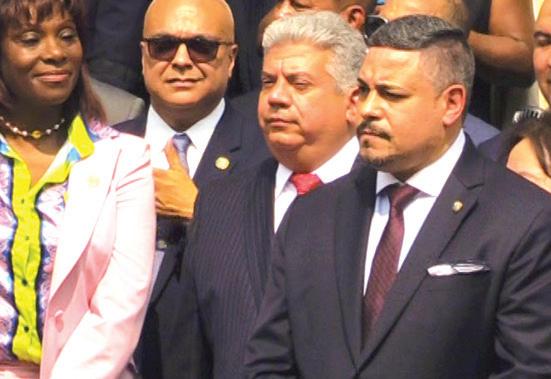
2 minute read
P’rkchester Native becomes Top Cop overseeing changes at the NYPD
By David Greene
Mayor Eric Adams was joined by local elected officials and top brass of the NYPD who gathered outside the 40th Precinct in Mott Haven as Adams sworein Parkchester native Edward Caban. The first Hispanic police commissioner, Caban will oversee the nation's largest police force with 36,000 officers and 19,000 civilian employees.
Advertisement
The 40th Precinct on Alexander Avenue was chosen for the swearing-in that was held on July 17, because this was where Caban began his police career in 1991. Caban was promoted to First Deputy Commissioner in 2022 and was named Acting Police Commissioner with the abrupt resignation of Keechant Sewell, the first woman to ever hold the post. Sewell stepped down in June.
Caban, who became the 46th Police Commissioner of the NYPD, told the crowd, "Together we will build upon our success and continue to drive down crime and improve the quality of life in our communities." He added, "To be the first Hispanic police commissioner is an honor of the highest measure.”
Minutes after Caban took his oath, Adams swore-in First Deputy Commission- er Tania Kinsella, the first woman to ever hold that post. Kinsella is a 20-year veteran of the department who was the commanding officer at the 120th Precinct on Staten Island before becoming the executive officer of the Patrol Service Bureau.
Borough President Vanessa Gibson said of Caban's appointment, "Commissioner Caban represents us and is a Bronx native and graduate of Cardinal Hayes High School... Today, in a full circle moment, Commissioner Caban returned to the 40th Precinct as our Police Commissioner.”
The following day Adams joined Caban for a ceremony at One Police Plaza as he named Rebecca Weiner as the Deputy Commissioner of Intelligence and Counterterrorism, becoming the first woman to hold that post.
On July 28, Caban did not join a trio of top police officials who held a question-and-answer session with members of the media regarding the recent upgrade of several police radio frequencies in Brooklyn, as those communications went silent on July 17. Members of the media can no longer hear transmissions on those frequencies as the system is overhauled with the new encryption.
At the start of the question-and-answer session Ruben Beltran, the Chief of Information Technology was asked if the communications blackout would be citywide and would there be a carveout for members of the press, Beltran replied, "Yes, we do plan to expand this upgrade," adding that upgrading the 40-year-old technology would be completed over the next year-and-a-half.
Regarding the press access to these communications, Beltran said, "We have been looking at other cities and we continue to explore our options to enable media access consistent with what the technology supports." Beltran was pressed several times on the issue of granting media access to police communications but didn't have an answer despite those changes having already be- gun.
After the confirmation by the NYPD of their encrypting their radio frequencies, the New York City Council issued a statement that read in part, "Transparency is key to achieving and maintaining public safety. It is troubling that the NYPD began encrypting its radio system without an adequate transparency plan implemented first.”

The statement added, "This rollout raises serious public safety and policy concerns that need to be further examined. The Council will continue to prioritize strengthening transparency and accountability to promote (the) safety of New Yorkers.”

Besides the new patrol cars with the green stripe, the NYPD had been using License Plate Readers (LPR's) to track a particular vehicle and the technology now works in conjunction with a new GPS launcher that sticks to a particular vehicle and can be followed by an aviation unit until it stops. The practice has resulted in numerous arrests in the past six months.
The most controversial technology is the "Digidog," a robotic dog that will soon be deployed during "active shooter" incidents and police standoffs.
One of the more unexpected changes relating to the NYPD was after securing a new contract in April, Police Benevolent Association (PBA) President Pat Lynch did not seek reelection and stepped down at the end of June when his term expired. Lynch was first elected in 1999. Lynch was replaced by Patrick Hendry, 51.










